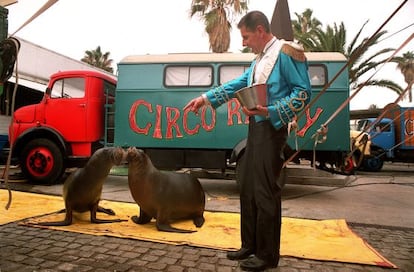“The whip is a thing of the past”
Rights groups and circus associations clash over proposal to ban animals in big tops

The decision of five of the seven political groups in the Catalan regional government to back a law banning all forms of circus acts involving live animals has reopened the debate on the treatment animals receive in captivity in Spain – not just under the big top but also in zoos.
“[The bill] prohibits the use of animals in circuses but not in activity at zoos; it is nonsensical,” said Carina Mejías, a deputy for the Ciutadans bloc, which, along with the conservative Popular Party, does not support the proposal.
Fleur Dawes is a spokeswoman for Animal Defenders International, which has been campaigning for years to abolish circuses that domesticate wild animals. She says that her organization’s investigations have revealed widespread abuse worldwide: “We have witnessed a culture of violence to get the animals to obey orders,” she explains. “We’ve seen everything from kicks to whipping.”
But Nacho Pedrera of the fan club Sí al Circo con Animales (Yes to circuses with animals) rejects accusations of abuse in Spain. “[Circuses] pass inspections constantly, up to several times a week and often without warning. It is also not true that training is held behind closed doors; there are many sessions that are open to the public. The whip is a thing of the past,” he says.
We have witnessed a culture of violence to get the animals to obey orders”
Catalonia is the first region in Spain to propose a blanket ban on circus animals, following the lead of Bolivia, which in 2009 became the first nation to do so. Only Greece has so far followed suit, with countries including Peru, Colombia, Paraguay, Costa Rica, Denmark, Holland and Austria imposing a ban on the use of certain species, especially exotic creatures.
The 1997 Amsterdam Treaty, to which Spain is a signatory, recognizes animals as “beings able to feel and to suffer.” In 2004, the World Organisation for Animal Health introduced the “five liberties” that establish the inherent rights of animals to an appropriate environment and diet, the ability to express natural behavior, protection from fear and stress and protection from harm, pain and illness.
Animal welfare groups FAADA, Born Free and ANDA, which together founded the Infocircus initiative, published a report on circuses in Spain detailing instances of abuse, such as the case of a baboon confiscated in 2010 in the town of Vilassar de Dalt, Barcelona. The animal had spent eight years living in a two-square-meter cage almost without light: “He was sickly, suffering from agoraphobia and showing serious behavioral problems. He also weighed 40 percent less than a baboon should.”
Although it admits that abuses and mistreatment exist in some circuses, the Association of Circus Professionals of Catalonia says the practice as a whole should not be demonized. “Use does not mean abuse. There are bad practices, but there are also those that treat their animals well,” says its president, Albert Fort.
There are bad practices, but there are also those that treat their animals well”
Alfonso de la Pola, vice president of the Andalusia Association of Circuses, admits that legislation in the sector is “weak.” But he also argues that shows featuring animals “have always existed and there is no reason they should be linked to exploitation.”
But the World Wide Fund for Nature disagrees, highlighting the risk that the use of exotic species in circus acts presents: “Much of the time these shows feature endangered species, and this leads people to view them as pets, increasing the trafficking of such animals on the black market,” says its head in Spain, Enrique Segovia.
Aside from circuses, the draft proposal opens the question as to what nature of shows should be included in the ban. “In circuses animals are treated far worse than in zoos. They lead an itinerant life and suffer aggressive training. There is little control over the activity of circuses, which are like a mafia. They traffic in animals and you never know where they obtain them.”
Although Segovia says he is not in favor of animal shows in zoos, he admits there is “very clear” legislation that guarantees their “good condition.” “Zoos have to meet three missions: environmental education, the welfare of the animal and the care of endangered species.”
Silvia Barquero, spokeswoman for the Partido Animalista political party, says that circus acts have no value of this kind. “It is just a small business; they don’t contribute anything and have no educational value.”
The groups behind Infocircus also warn of secondary problems from keeping wild animals in unsuitable conditions, pointing out that escape is a real danger. In August 2009, for example, an elephant ran amok in the streets of l’Escala, Girona. Also of concern is the risk of disease. Circus elephants and camels can be susceptible to various strains of tuberculosis.
Tu suscripción se está usando en otro dispositivo
¿Quieres añadir otro usuario a tu suscripción?
Si continúas leyendo en este dispositivo, no se podrá leer en el otro.
FlechaTu suscripción se está usando en otro dispositivo y solo puedes acceder a EL PAÍS desde un dispositivo a la vez.
Si quieres compartir tu cuenta, cambia tu suscripción a la modalidad Premium, así podrás añadir otro usuario. Cada uno accederá con su propia cuenta de email, lo que os permitirá personalizar vuestra experiencia en EL PAÍS.
¿Tienes una suscripción de empresa? Accede aquí para contratar más cuentas.
En el caso de no saber quién está usando tu cuenta, te recomendamos cambiar tu contraseña aquí.
Si decides continuar compartiendo tu cuenta, este mensaje se mostrará en tu dispositivo y en el de la otra persona que está usando tu cuenta de forma indefinida, afectando a tu experiencia de lectura. Puedes consultar aquí los términos y condiciones de la suscripción digital.








































